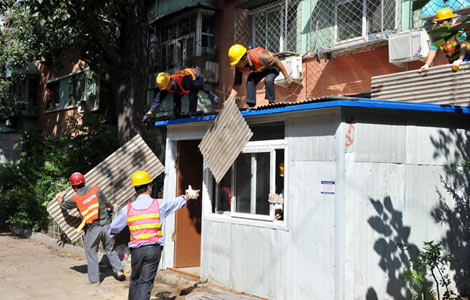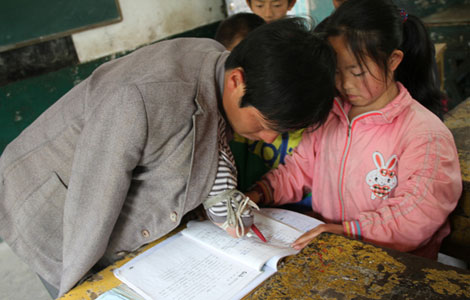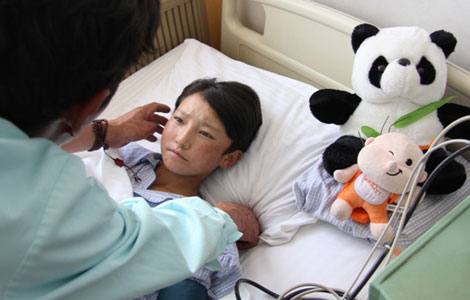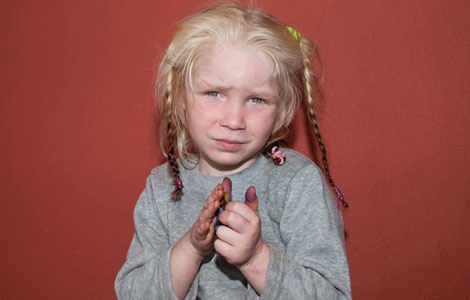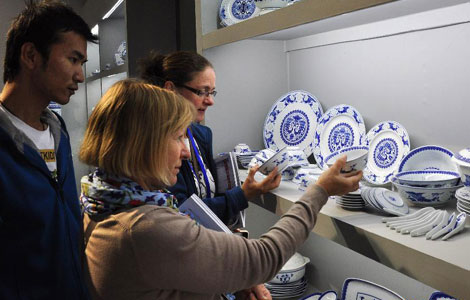Probe to target use of subsidies
Updated: 2013-10-20 23:11
By He Dan and Yang Yao (China Daily)
|
||||||||
Inspection to focus on proper checks to identify eligibility for assistance
The State Council is about to launch a national investigation of whether local governments have properly used "lifesaving" money to subsidize underprivileged families, a senior official said.
The inspection will focus on whether local governments have conducted financial status checks to properly identify those eligible for the minimum living subsidies, Dou Yupei, vice-minister of civil affairs, told China Daily in a written interview.
Ensuring that local governments adjust subsidy standards to keep pace with inflation and have earmarked sufficient funds are other key areas that will be highlighted during the inspection, he said.
The moves come one year after the State Council, or China's cabinet, issued guidance on improving the minimum living subsidy policies.
Minimum living subsidies are "lifesaving" money and the ministry applies "zero tolerance" to any malpractice in this regard, Dou said.
To verify applicants' eligibility, since 2009 the ministry has started pilot programs in 143 regions that require relevant governmental departments and financial institutions to carefully check an applicant's family income, bank accounts, ownership of vehicles, property, stocks and other assets.
Dou said the process of sound financial evaluations of applicants will be adopted nationwide by the end of 2015.
Lu Hanlong, a professor at the Institute of Sociology under the Shanghai Academy of Social Sciences, said there is a worrying phenomenon that some local officials wink at false claims from friends and relatives.
It is urgent to bring in social workers to conduct the verifications and strengthen frontline workers' accountability by requiring their signatures on the distribution lists so the government can trace false claims and make sure rule violators are punished, he said.
In the first eight months of this year, the central government allocated 103.2 billion yuan ($16.9 billion) to subsidize families struggling in poverty, according to statistics from the Ministry of Civil Affairs.
As of August, 21 million urban residents were receiving a monthly subsidy of 239 yuan and 53 million rural residents monthly financial support of 104 yuan each on average.
In the past decade, the coverage of minimum living subsidies has grown rapidly in rural areas, with the number of rural recipients increasing from 4.1 million in 2002 to 53.4 million in 2012.
Li Chao received a monthly subsidy of 300 yuan before he found a job as a noodle chef in a small restaurant in Beijing.
His parents said his subsidy was cut off as soon as he was employed although his current job only pays a monthly salary of 800 yuan. Employees' average monthly income in the capital was about 5,200 yuan in 2012.
Li's parents, who are blue-collar workers in their 50s, worry that the family will be trapped in poverty when they soon retire with pensions much lower than their current wages and if their son loses his job. They are not sure whether he can apply for the subsidy again.
Ge Daoshun, a social policy expert at the Chinese Academy of Social Sciences, said the low cash subsidies can only protect people from starvation.
"The current subsistence allowance system can only solve the problem of food for the poor but fails to take into consideration other factors including housing and medical care that are vital for a national's survival," he said.
He urged the government to come up with holistic intervention policies that can meet the diverse needs of different social groups including children, seniors and people with disabilities.
Contact the writers at hedan@chinadaily.com.cn and yangyao@chinadaily.com.cn
Most Viewed
Editor's Picks

|

|

|

|

|

|
Today's Top News
Life of Pi artwork on display
No criminal charges in Asiana crash death: DA
Extradition deal with US key to nabbing fugitives
Seattle high-tech summit talks 'green'
JPMorgan reaches $13b deal
Li urges greater effort on reforms
Canada welcomes China to invest
Australian authorities fear worsening wildfires
US Weekly

|

|

